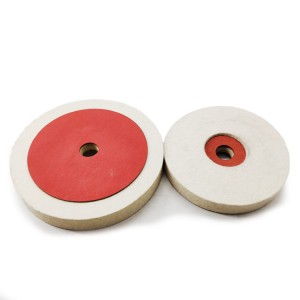In the face of increasingly stringent environmental policies around the world, the wool felt wheel industry is undergoing a major transformation to reduce its environmental footprint and meet regulatory requirements. As governments and consumers alike demand more sustainable manufacturing practices, companies in the wool felt wheel industry are taking proactive steps to adapt and thrive in the new environmental landscape.
One of the primary areas of focus for the industry is the reduction of waste generation. Traditional wool felt wheel manufacturing processes often produce significant amounts of waste, including excess wool fibers and scraps. To address this, manufacturers are implementing waste – reduction strategies such as optimizing their cutting processes to minimize material waste. Some companies are also exploring innovative ways to recycle and reuse waste materials. For example, leftover wool fibers are being repurposed into lower – grade felt products or used as insulation materials, closing the loop on the production cycle and reducing the amount of waste sent to landfills.
Another key aspect of the industry’s adaptation to environmental policies is the reduction of chemical usage. Many traditional polishing compounds used with wool felt wheels contain harmful chemicals that can have negative impacts on the environment and human health. In response, manufacturers are researching and developing eco – friendly polishing compounds that are free from toxic substances. These new compounds not only meet environmental regulations but also offer similar or even better performance than their traditional counterparts. By using these sustainable polishing compounds, the wool felt wheel industry can reduce its contribution to air and water pollution associated with chemical runoff.
Energy consumption is also a major concern for the industry. Manufacturing wool felt wheels requires a significant amount of energy, from processing the wool fibers to operating the machinery. To reduce their energy use, companies are investing in energy – efficient equipment and adopting renewable energy sources. Solar panels are being installed on factory rooftops to generate clean energy, and energy – saving technologies are being integrated into the production processes. These measures not only help the industry comply with environmental policies related to energy consumption but also lead to long – term cost savings for manufacturers.
In addition to these operational changes, the wool felt wheel industry is also focusing on improving the recyclability of its products. Many consumers are now more conscious of the end – of – life disposal of the products they purchase. As a result, manufacturers are designing wool felt wheels with recyclability in mind, using materials that can be easily recycled or composted. This not only reduces the environmental impact of the products but also enhances the brand image of the companies, as consumers are more likely to support environmentally responsible businesses.
The adaptation of the wool felt wheel industry to environmental policies is not without its challenges. Implementing sustainable practices often requires significant upfront investment in research, development, and new equipment. However, the long – term benefits, including improved brand reputation, reduced operating costs, and access to new markets that prioritize sustainability, make it a worthwhile endeavor. As environmental policies continue to tighten, the wool felt wheel industry will need to remain innovative and flexible to ensure its continued growth and success in a more sustainable future.

Post time: Jun-13-2025
